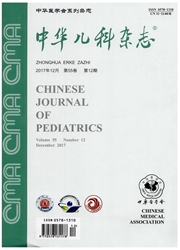

 中文摘要:
中文摘要:
目的 分析中国汉族散发性激素耐药型肾病综合征(SRNS)儿童MYO1E基因突变及其特点.方法 研究对象为54例中国汉族散发性SRNS患儿,对照人群为59名尿检正常的健康志愿者.取所有研究对象外周静脉血3 ml,提取基因组DNA; PCR扩增MYO1E基因全部28个外显子及其周围的部分内含子;应用DNA直接测序法、限制性酶切片段分析法进行MYO1E基因突变分析.结果 在54例散发性SRNS病例中共发现MYO1E基因51个变异.其中有10个变异IVS1-11T>C、IVS2-86T>A、279T> C(D93D)、IVS6-181G>A、718C> T(L240F)、1678A> G(T560A)、IVS16-35A>G、IVS18 +48T>A、IVS19+ 38G>A和IVS25+13C>T在59名正常对照人群未检出,表明它们是MYO1E基因突变;另41个变异在美国国立生物技术信息中心(NCBI)的单核苷酸多态性(SNP)数据库中已公布,属于MYO1E基因多态性.上述新发现的10个MYO1E基因突变呈单杂合状态.结论 MYO1E基因突变不是本研究中国汉族散发性SRNS患儿的主要致病原因.
 英文摘要:
英文摘要:
Objective Previous studies have demonstrated that two homozygous missense MYO1E mutations are associated with childhood autosomal recessive focal segmental glomerulosclerosis in steroidresistant nephrotic syndrome (SRNS) families from Italy and Turkey.Non-disease-causing heterozygous MYO1E variants were also found in other SRNS patient cohorts.However,the role of MYO1E mutations in Chinese sporadic SRNS has not been established.Method Peripheral blood samples were collected for genetic analysis from 54 children with sporadic SRNS in Chinese Han ethnic group and a normal control group of 59 healthy adult volunteers.None of the patients carried mutations in NPHS2 or WT1.Genomic DNA was extracted from peripheral blood leukocytes.Twenty-eight exons and exon-intron boundaries of the MYO1E gene were amplified by polymerase chain reaction.Mutational analysis was performed by direct DNA sequencing and restriction endonuclease digestion.Result Fifty-one variants in the MYO1E gene were identified in 54 children with sporadic SRNS.Among them,10 MYO1E mutations of IVS1-11T 〉 C,IVS2-86T 〉 A,279T 〉 C (D93D),IVS6-181G 〉 A,718C 〉 T (L240F),1678A 〉 G (T560A),IVS16-35A 〉 G,IVS18 + 48T 〉 A,IVS19 + 38G 〉 A and IVS25 + 13C 〉 T were detected in 11 patients,whereas they were absent in the 59 normal Chinese controls.Forty-one variants in MYO1E were identified and all of them were published in single nucleotide polymorphism database from national center for biotechnology information.Furthermore,all the 10 MYO1E mutations were in heterozygous states.Conclusion MYO1E mutations are not a major cause of Chinese children with sporadic SRNS in the study.
 同期刊论文项目
同期刊论文项目
 同项目期刊论文
同项目期刊论文
 期刊信息
期刊信息
